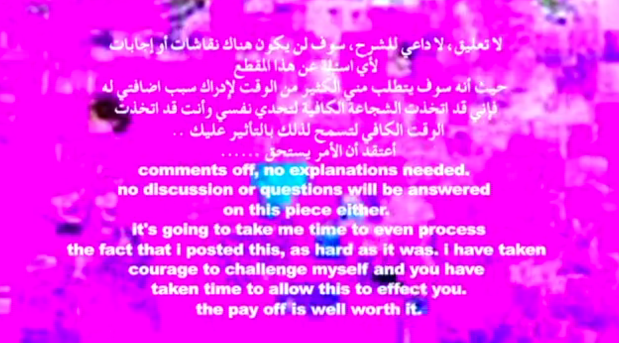
The compression and glitch caused by poor Internet connections give the rise to aesthetic and political reflections in Tariq Hashim’s film www.Gilgamesh.21 (2007), which documents a long-distance collaboration between Hisham, in Copenhagen, and his collaborator, Basim, in Baghdad, as they rehearse a play of the eighteenth-century-BC epic Gilgamesh via webcam, Youtube, and text messaging. In Baghdad the connection is poor and electricity cuts out often, interrupting their communication and introducing metallic echoes into their speech, Each bemoans his conditions: tariq@Copenhagen writes, “I live in the chilly hell of exile, up in the north of this planet.” basim@Baghdad replies “Me, I am in a burning hell, in the city of death” The deprivation of postwar Iraq and the pain of exile are compounded when together (by uploading movies of themselves watching the screen) the actors watch Youtube videos uploaded by American soldiers in Iraq. These movies reveal sickening bigotry and ignorance, and they usually boast much higher resolution than the actors are able to achieve in their own communications. In silence, the actors watch these puerile, racist movies that reach much larger audiences than their erudite Babylonian adaptation likely will. But Basim and hashim’s low quality, long-distance montage, achieved by great effort, yields images of much greater intensity.

Coming together over poor Internet connections is also a theme of Mahmoud Khaled Camaraderie (2009), a meditation on the culture of male body builders composed of videos posted to Youtube: men posting, competing, oiling and massaging each other’s bodies, cheering. As the athletes’ gleaming bodies break into pastel pixels, we occupy the position of a viewer accessing this material at home online, a position of unofficial or unauthorized spectatorship. The voyeuristic feeling is even more pronounced in a shot of a young man recording himself in the mirror as he raises his shirt to reveal his buff torso. At one point, a group shot of athletes and their shouting supporters breaks up into a spectacular single moving mass of flesh – and fuchsia-colored pixels. Over it the following text, in Arabic and English, is placed:
comments off, no explanations needed.
no discussion or questions will be answered on this piece either.
it’s going to take me time to even process the fact that I posted this, hard as it was. I have taken courage to challenge myself and you have taken the time to allow this to affect you.
the pay off is well worth it.


In this address, the glitchy, low-resolution images indicate the longing of lonely Internet viewers, in countries where homosociality is the norm but homosexuality is illegal- and also their ways of building connections. The energy of effort, display, mutual support , and the desire unites these men as a collective. both those who perform onscreen and those present as online spectators. The Egyptian national anthem accompanies one of these exhibitions, suggesting that this unofficial culture may have more staying power —more “legs”— than the moribund Egyptian national culture circa 2009. Khaled challenges viewers to recognize that what we desire most may be the inverse of what is clearly visible and accessible.
Hanan Al-Cinema: Affections for the Moving Image, Laura U. Marks